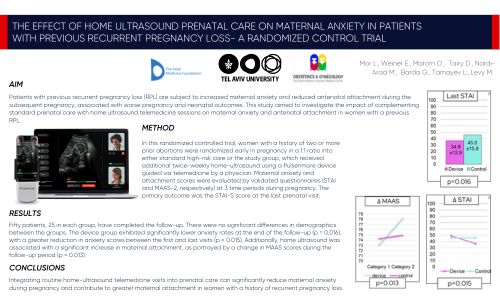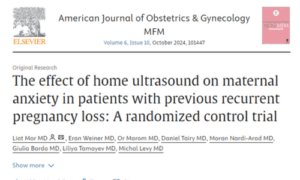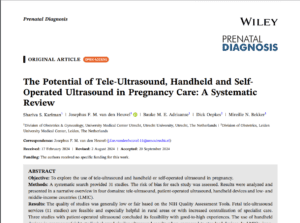Authors:
Mor L., Weiner E., Marom O., Tairy D., Nardi-Arad M., Barda G., Tamayev L., Levy M.
Aim:
Patients with previous recurrent pregnancy loss (RPL) are subject to increased maternal anxiety and reduced antenatal attachment during the subsequent pregnancy, associated with worse pregnancy and neonatal outcomes. This study aimed to investigate the impact of complementing standard prenatal care with home ultrasound telemedicine sessions on maternal anxiety and antenatal attachment in women with a previous RPL.
Method:
In this randomized controlled trial, women with a history of two or more prior abortions were randomized early in pregnancy in a 1:1 ratio into either standard high-risk care or the study group, which received additional twice-weekly home-ultrasound using a Pulsenmore device guided via telemedicine by a physician. Maternal anxiety and attachment scores were evaluated by validated questionnaires (STAI and MAAS-2, respectively) at 3 time periods during pregnancy. The primary outcome was the STAI-S score at the last prenatal visit.

Results:
Fifty patients, 25 in each group, have completed the follow-up. There were no significant differences in demographics between the groups. The device group exhibited significantly lower anxiety rates at the end of the follow-up (p = 0.016), with a greater reduction in anxiety scores between the first and last visits (p = 0.015). Additionally, home ultrasound was associated with a significant increase in maternal attachment, as portrayed by a change in MAAS scores during the follow-up period (p = 0.013).
Conclusion:
Integrating routine home-ultrasound telemedicine visits into prenatal care can significantly reduce maternal anxiety during pregnancy and contribute to greater maternal attachment in women with a history of recurrent pregnancy loss.









